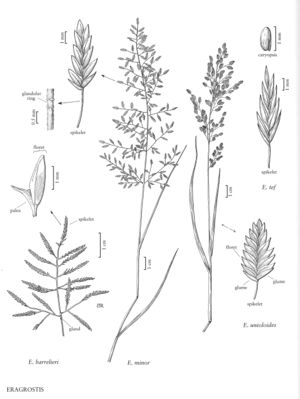Eragrostis tef
Plants annual; loosely tufted, without innovations, without glands. Culms 25-60 cm, erect, glabrous and shiny. Sheaths mostly glabrous, apices hairy, hairs to 5 mm; ligules 0.2-0.4 mm, ciliate; blades 10-30 cm long, 2-5.5 mm wide, flat to involute, glabrous abaxially, scabridulous adaxially. Panicles 10-45 cm long, 2.5-22 cm wide, ovate, open to contracted; primary branches 4-17 cm, appressed or diverging up to 50° from the rachises, flexible, naked below; pulvini glabrous or hairy, hairs to 5 mm; pedicels 2.5-17 mm, appressed or divergent. Spikelets 4-11 mm long, 1.3-2.5 mm wide, linear-lanceolate to ovate, stramineous, grayish-green to purplish, with 4-16 florets; disarticulation tardy, acropetal, caryopses falling before the glumes and lemmas, paleas persistent. Glumes lanceolate, membranous to hyaline; lower glumes 1-2 mm; upper glumes 1.5-2.8 mm; lemmas 1.6-3 mm, lanceolate, membranous, apices acute; paleas 1.4-2.2 mm, hyaline, keels scabridulous, apices obtuse; anthers 3, 0.2-0.5 mm, purplish. Caryopses 0.7-1.3 mm, obovoid, not grooved, smooth, light brown to whitish. 2n = 40.
Distribution
S.C., N.C.
Discussion
Eragrostis tef is native to northern Africa. In Ethiopia, it is used both as a grain and as fodder for cattle. It is also grown, but not commonly, for these purposes in the Flora region and is occasionally found as an escape from cultivation.
Selected References
None.
